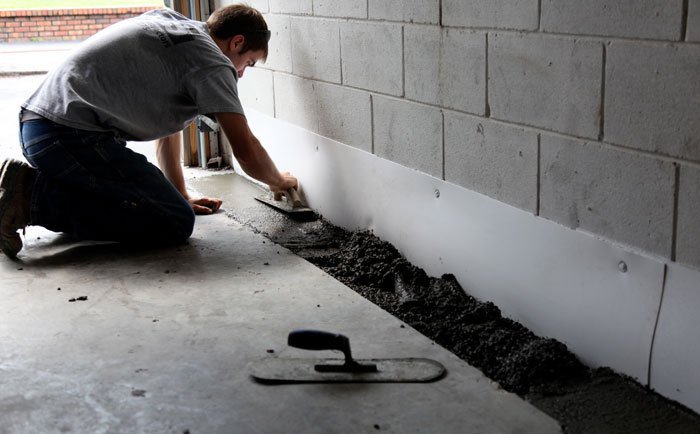Basement Waterproofing Washington Dc
Basement Waterproofing in Washington Dc refers to the methods and materials used to keep water out of a building’s basement. Sealing materials drains, and sump pumps, among other things, may be required to waterproof a basement that is below ground level.
Basements are particularly susceptible to wetness and moisture buildup. Hydrostatic Pressure is exerted beneath basement floors and walls due to water in the soil.
Water can be forced into fractures by this hydrostatic pressure, causing serious structural damage as well as mold, rot, and other moisture-related issues.
Improper soil and drainage systems, poorly installed and maintained gutters, an improper slope, hydrostatic pressure and condensation, and other factors all contribute to this. Waterproofing Contractor in Washington Dcis designed to prevent all of these problems.
Waterproofing Contractor Near Me
Interior Sealants
Enquire Now


Cracks and Pipe Penetrations are the most prevalent entry locations for seepage in poured Concrete Foundations.
From the inside, these apertures can be sealed. Epoxies or urethanes, which are strong adhesives, can be pressure injected into the openings, penetrating the foundation to the exterior and blocking the seepage path.
Interior Sealers are useful for preventing High Ambient Humidity from soaking into the porous Masonry and causing spalling inside the basement. Interior sealants are intended to keep the basement’s ambient humidity at a minimum.
Waterproofing your basement with internal sealants prevents moisture from being absorbed by the basement walls and floors, as well as moisture from overflowing into other areas of the house.
Waterproofing Contractors in Washington Dc
The exterior basement waterproofing in Washington Dc method coats the outer basement walls with polymers and membranes to prevent water from causing serious structural damage to the building. Polymer-Based Waterproofing Solutions may be sprayed directly onto a wall, cure quickly, and are semi-flexible enough to allow for some substrate movement.
Basement Contractor Near Me in Washington Dc
When condensation is the primary source of moisture, interior basement waterproofing with coatings is successful. It also works if the problem is caused by minor wetness. One of the most efficient ways to save your basement is to install a backwater valve.
Installing a drainage system is the ultimate solution to Basement Waterproofing Contractor in Washington Dc . There are a variety of ways and materials that can be used.
A French drain with a sump pump, rubber walls, water weeping tiles, and a drainage membrane is one proper alternative. This method allows water to flow freely without causing damage to the walls.
Because water can seep in through cracks in the foundation and inefficient heating or cooling can generate a buildup of moisture or condensation, your basement is especially sensitive to water damage.
As a result, Basement Waterproofing in Washington Dcis critical. Its benefits are Improved indoor climate, Protection for the Basement Floor, Your sump pump will be protected, Defend against structural deterioration and Lower Your Energy Bills
What is the Proper Solution for Basement Waterproof In Washington Dc
When it comes to keeping your basement safe, there are numerous variables to consider. The scenario may be different, prevention is preferable to repair.
Make an appointment with an A1 Masonry contractors and secure the basement.
What Are Common Signs of Leaking Basement Issues?
Many basement water issues are easy to spot, since water isn’t supposed to be in your home, but some very common signs include:
- Mold and mildew growth
- Cracks in walls or floors
- Standing water
- Corroded power outlets or rotting wood beams
Noticing these signs early can help you avoid serious foundation and basement problems later on.
Leaking Basement in Washington Dc
There are many causes of water in the basement, especially if you live in a particularly rainy or wet area. Some common causes include:
Moisture condensation – this happens when warm, moist air meets your home’s cool foundation walls, resulting in noticeable wet spots on basement floors and walls.
Groundwater will swell once the ground has absorbed as much water as it can. The soil around your foundation cannot absorb the extra water. As a result, water runoff can come in contact with your foundation, causing more problems in your basement.
Water runoff – when we have weather events such as snow and rain, a percentage of water seeps into the ground. Any of this water that is not absorbed is called runoff. Runoff that is not diverted away from your home properly causes hydrostatic pressure to build up against your home’s foundation walls and floor. This forces the water through cracks and gaps. You may notice water seeping up from the joints between the wall and the floor.
If you know the causes of basement water problems, you’ll be more prepared to notice the signs and inspect your basement after a large storm or rainy season.
Why basement walls are important?
Basement walls are an important part of a strong, stable foundation. They create an air space between the dirt and the basement walls, which helps to insulate the house from the cold ground temperature. Underground, there’s usually a layer of frozen soil that can get as cold as 32 degrees below zero in some climates. The dirt preventing your basement walls from getting in direct contact with the soil can help to prevent the moisture in the surrounding soil from seeping into your basement through cracks or holes in your walls. The space between your basement walls also enables you to install sheetrock on every side of your basement, which is necessary for creating a finished home theater. If you want to ensure a proper foundation for your building and prevent mold and mildew from forming behind your walls, you should choose A1 masonry contractors for your next home improvement project.
The basement wall construction is based on a concrete foundation wall with wood framing for support. The wood framing consists of horizontal 2″x4″ studs with vertical 2″x4″s attached at right angles as cross braces. The horizontal members are fixed onto brackets that are set into holes in concrete blocks or poured into masonry anchors on top of the blocks.






